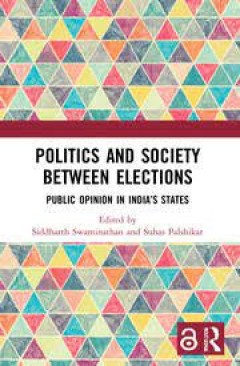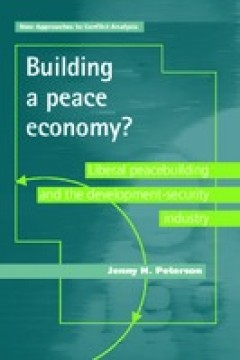Filter by

Lifestyle Politics and Radical Activism
This book is available as open access through the Bloomsbury Open Access programme and is available on www.bloomsburycollections.com. Attempts by people to enact their political beliefs in their daily lives have become commonplace in contemporary US culture, in spheres ranging from shopping habits to romantic attachments. This groundbreaking book examines how collective social movements have cu…
- Edition
- -
- ISBN/ISSN
- 9781441157430
- Collation
- -
- Series Title
- -
- Call Number
- -

Global Citizenship Education Critical and International Perspectives
This open access book takes a critical and international perspective to the mainstreaming of the Global Citizenship Concept and analyses the key issues regarding global citizenship education across the world. In that respect, it addresses a pressing need to provide further conceptual input and to open global citizenship agendas to diversity and indigeneity. Social and political changes brought …
- Edition
- -
- ISBN/ISSN
- -
- Collation
- -
- Series Title
- -
- Call Number
- -

On Public Imagination: A Political and Ethical Imperative
In this wide-ranging and multidisciplinary volume, leading scholars, activists, journalists, and public figures deliberate about the creative and critical potential of public imagination in an era paradoxically marked by intensifying globalization and resurgent nationalism. Divided into five sections, these essays explore the social, political, and cultural role of imagination and civic engagem…
- Edition
- -
- ISBN/ISSN
- 9780429343599
- Collation
- -
- Series Title
- -
- Call Number
- -

US Public Schools and the Politics of Queer Erasure
This book presents a history of queer erasure in the US public school system, from the 1920s up until today. By focusing on specific events as well as the context in which they occurred, Lugg presents a way forward in improving school policies for both queer youth and queer adults.
- Edition
- -
- ISBN/ISSN
- 978-1-137-53526-9
- Collation
- -
- Series Title
- -
- Call Number
- -

Two Decades of Basic Education in Rural China Transitions and Challenges for…
This book examines how educational change has progressed in three contrasting areas spread across China since 1990, exploring key issues concerning rural education in poor, rich and minority areas. Of the three areas covered in this book, the first is a rich one near Beijing; the second is in the northwest in Shanxi on the Loess plateau; and the third is in Sichuan on the high plateau leading t…
- Edition
- -
- ISBN/ISSN
- 978-981-10-2120-6
- Collation
- -
- Series Title
- -
- Call Number
- -

Ghosts in the Neighborhood: Why Japan Is Haunted by Its Past and Germany Is Not
Germany, which brutalized its neighbors in Europe for centuries, has mostly escaped the ghosts of the past, while Japan remains haunted in Asia. The most common explanation for this difference is that Germany knows better how to apologize; Japan is viewed as “impenitent.” Walter F. Hatch rejects the conventional wisdom and argues that Germany has achieved reconciliation with neighbors by sh…
- Edition
- -
- ISBN/ISSN
- 9780472903108
- Collation
- -
- Series Title
- -
- Call Number
- -

Lenin and the Making of the Soviet State A Brief History with Documents
Vladimir Ilich Lenin (1870 - 1924) led the first successful revolt against market-based liberal democracy and founded the Soviet State in 1917, serving as the new nation s chief architect and sole ruler for the next five years. This collection of primary sources allows readers to learn about Lenin through his own words and emphasizes Lenin s actions rather than his ideology. Jeffrey Brooks and …
- Edition
- -
- ISBN/ISSN
- -
- Collation
- -
- Series Title
- -
- Call Number
- -

Coronavirus Politics
COVID-19 is the most significant global crisis of any of our lifetimes. The numbers have been stupefying, whether of infection and mortality, the scale of public health measures, or the economic consequences of shutdown. Coronavirus Politics identifies key threads in the global comparative discussion that continue to shed light on COVID-19 and shape debates about what it means for scholarship i…
- Edition
- -
- ISBN/ISSN
- 9780472902460
- Collation
- -
- Series Title
- -
- Call Number
- -

Politics and Society between Elections Public Opinion in India’s States
Elections are episodic; governance is routine. This book studies patterns in public opinion on politics and society between elections in India. By using the survey data covering 24 Indian states including the National Capital Region of Delhi (NCR), it will serve as State barometers of public opinion. The surveys seek to understand how politics and governance processes are nested in the social a…
- Edition
- -
- ISBN/ISSN
- 9781003120483
- Collation
- -
- Series Title
- -
- Call Number
- -

Building a Peace Economy?
This book critically examines the range of policies and programmes that attempt to manage economic activity that contributes to political violence. It offers a new framework for understanding both the problem of economic activity in conflict zones as well as programmes aimed at managing these and transforming them into more peaceful economic and political relationships. Through this examination…
- Edition
- -
- ISBN/ISSN
- 9781526129376
- Collation
- -
- Series Title
- -
- Call Number
- -
 Computer Science, Information & General Works
Computer Science, Information & General Works  Philosophy & Psychology
Philosophy & Psychology  Religion
Religion  Social Sciences
Social Sciences  Language
Language  Pure Science
Pure Science  Applied Sciences
Applied Sciences  Art & Recreation
Art & Recreation  Literature
Literature  History & Geography
History & Geography